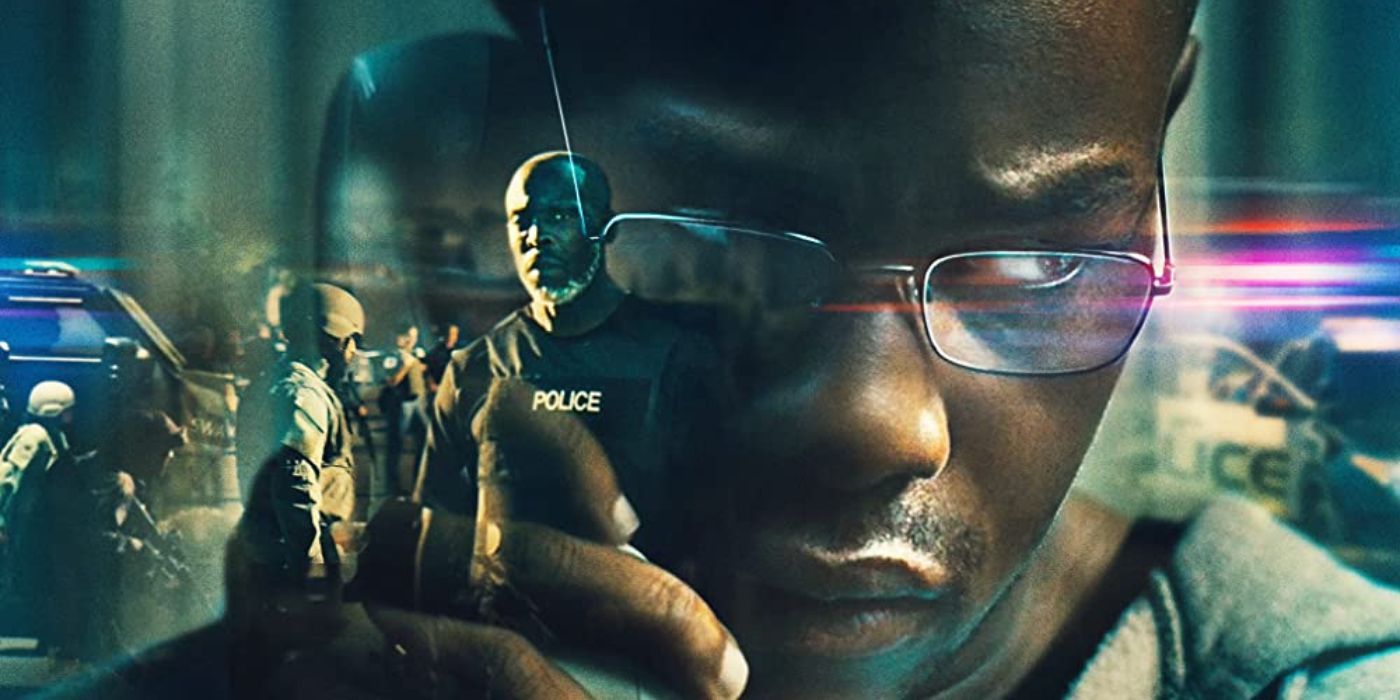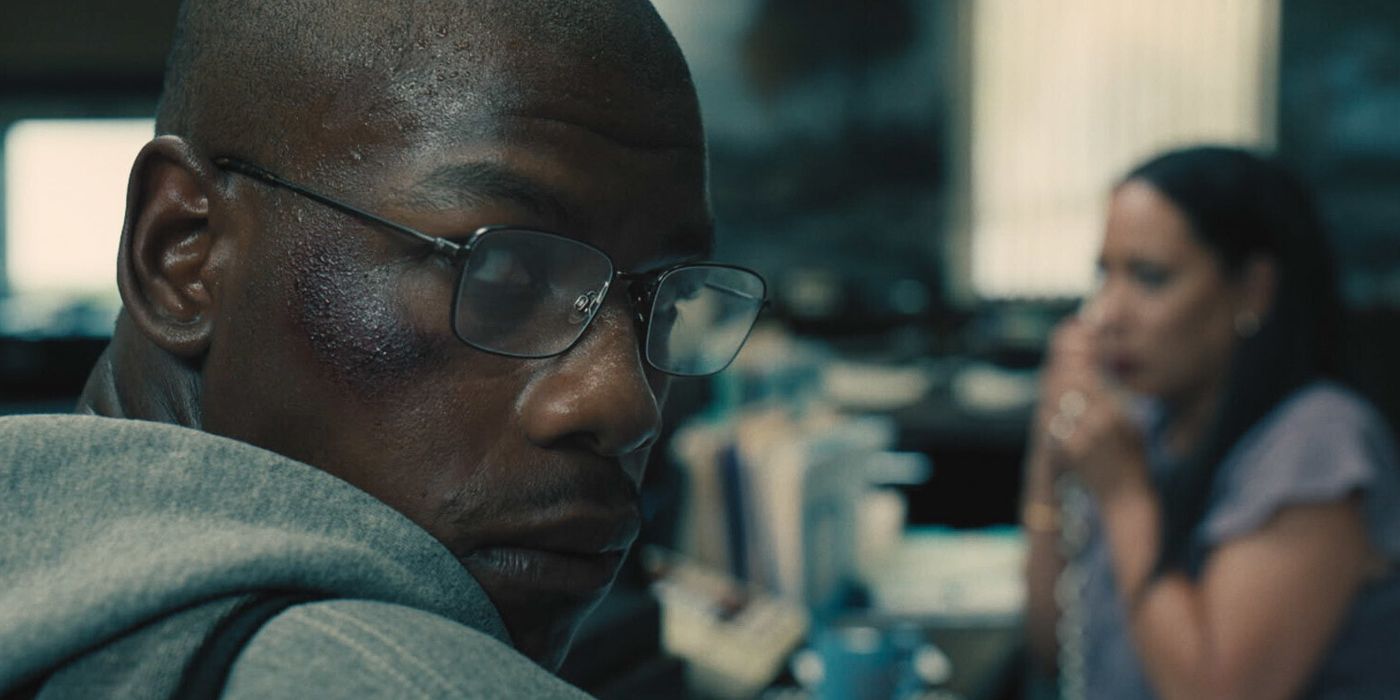This review was originally published as part of our Sundance 2022 coverage.
In 2017, Lance Corporal Brian Easley made national headlines when he walked into a Wells Fargo bank in Atlanta, Georgia, and told a bank teller that he had a bomb in his backpack. His intentions were not to rob the bank as some might expect. His plan was to use the hostage situation to call attention to the fact that the Department of Veterans Affairs had withheld an $892 check that was rightfully his. Despite the best efforts of some first responders who recognized Easley’s desperation, he was still ultimately a Black man in America suffering from a mental health crisis.
Easley’s story and its tragic outcome were later reported on in-depth by Task & Purpose reporter Aaron Gell, whose detailed coverage on the system that failed an American Veteran went on to inspire Abi Damaris Corbin and Kwame Kwei-Armah’s screenplay. The film also marks Corbin’s feature directorial debut and she displays a keen eye for capturing shots that are both evocative and character-driven without ever being gratuitous. Even Easley’s tragic death is portrayed with respect, offering only a grim track of blood as the Andros robot departs from his lifeless body.
John Boyega stepped into the role of Easley last year when Jonathan Majors was waylaid by his commitments to Marvel. Boyega is undoubtedly one of the best and brightest performers of his generation. While Star Wars may have pushed him fully into the public eye, his ability to beautifully convey the full gamut of human emotions in Detroit, Small Axe, and now Breaking has secured his place as a powerhouse in the industry. Easley is not an easy role to embody because he was a real-life person who met a tragic end only five years ago.
Where there might have been an impulse to lean into the PTSD, schizophrenia, paranoia for dramatic effect, Boyega instead plays it with thoughtful nuance. In a short window of time, you come to care so much for Easley that the heartbreak of the ending is that much worse. Even when he reveals his plans at the bank and takes Estel Valerie (Nicole Beharie) and Rosa Diaz (Selenis Leyva) hostage, you can empathize with him and understand what pushed him to the brink. Beharie gives an outstanding performance, trying to keep a cool and collected demeanor, while containing her fear. Both Leyva and Beharie worked well with Boyega, helping to convey this sense of terror mixed with understanding.
Despite the arrival of a fairly diverse police force, there is no confusion here about whose side the cops are on as they prepare to get the two hostages out. It doesn’t flow like hostage negotiations do in films because this is inspired by a true story—the police are slow to respond, they butt heads with the press, the FBI refuses to communicate with the family, and they ultimately fail, not only Easley, but the hostages that have to live with the guilt of his death.
While the cops try to figure out what their plan is, Easley makes contact with a local news reporter named Lisa Larson (Connie Britton) who lends him an ear to listen. She thoughtfully engages with him, trying to understand his motivations and talk through his desperate actions. They discussed his daughter, his military service, and his frustrating experience with the VA. During these moments, Corbin utilizes clever flashbacks—showing snippets of conversations with his daughter, his tour overseas, and his dead-end conversations with the VA. They help the audience connect to Easley, without ever detracting from the present.
In one of his final roles, Michael K. Williams portrays Eli Bernard, a fictionalized version of Sgt. Andre Bates, the negotiator who finally arrived on the scene. Like Easley, he was a former Marine, and Black man, who had dealt with the VA. Breaking frames their conversations with the same heartbreak as the true story, pulling direct quotes from recordings of that fateful day. By all accounts, the negotiator believed that Easley would walk out of the bank alive once they arrived at an agreement. He was confident that Easley’s life was worth more than $892.
What’s truly heartbreaking about Breaking is that Easley’s death accomplished nothing. The police department felt justified in their actions, the Department of Veteran Affairs never corrected their mistake or paid his family what was owed to him; there has been no reform of the VA, or movement to solve the veteran homelessness crisis, or directives to improve mental health care. His plight was an outlier, it’s the norm for how many veterans are treated in America. Hopefully, with the renewed interest in his story that this film will garner, something can be done to help the next Brian Easley, before it's too late.
Breaking is a powerful film that will leave audiences reeling as the credits roll. Corbin and Armah neatly adapted a tragic reality and presented it with grace and understanding, which will hopefully force audiences to think about the reality they live in. For some people, the systems that are in place to allegedly help, offer assistance in the form of pamphlets, long lines, and sniper sights.
Grade: A
Breaking opens in theaters on August 26.


